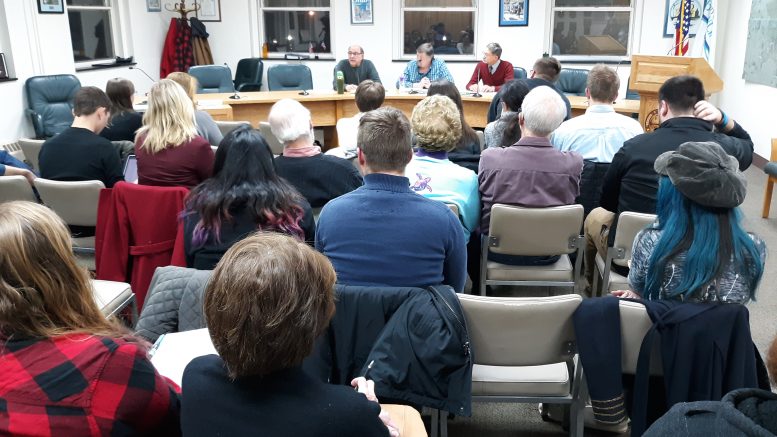By JAN LARSON McLAUGHLIN
BG Independent News
Bowling Green City Council Chambers was packed Tuesday evening with people who have disdain for single-use plastic bags, and people who rely on them to do their jobs.
The hearing was held by City Council’s Community Improvement Committee, made up of Mark Hollenbaugh, Bill Herald and John Zanfardino. Hollenbaugh explained the city is exploring a myriad of options for single-use plastic bags.
Nine citizens voiced their support or opposition to possible plastic bag regulation in the city. Seven were in support, and two were against. Another hearing will be held March 4, at 6 p.m., in city council chambers, to give more citizens a chance to share their feelings.
James Egan suggested that any fees raised be used to track the effect of a ban, since little data is available.
Madi Stump said the plastic bag debate is a sustainability issue, and communities can learn to adapt to changes in their consumer cultures.
Joe DeMare estimated that 150 municipalities across the nation have banned or charge fees for single-use plastic.
The problem may seem overwhelming, but that doesn’t mean that communities should give up.
“Plastic bags can be at the top of the list,” DeMare said. He mentioned the problem with blowing plastic bags at the Wood County Landfill, west of Bowling Green. An ordinance on bags can be an attempt to deal with a highly visible part of the overall problem.
“Eventually, we’re going to have to deal with the entire iceberg,” DeMare said.
Zanfardino said he was glad to see places like Cuyahoga County tackling the plastic bag problem.
“I’m heartened to see other cities looking at this in Ohio,” he said.
Tom Klein’s only reservation on the possible plastic bag ordinance is that it doesn’t go far enough.
“We’re drowning in waste,” Klein said. And banning plastic bags makes people feel as if they are solving a problem. “They’re deceptive. They make us feel like we’re dealing with the problem.”
But Robin Belleville, owner of BG Frosty Fare, said her business relies on the bags to send food orders home with customers.
“I come to you urging a ‘no’ vote,” she said. A five or 10 cent fee per sale would have a “huge impact” on her business.
“Each and every sale matters to my bottom line,” Belleville said, saying a fee would make her reconsider operating a business in Bowling Green.
She mentioned that her husband’s family business, Belleville Brothers, also relies on plastic bags. When customers bring in their own bags, there are sanitary concerns to consider, she said.
“They don’t want to put meat back into a bag,” that has already been used, she said.
“I think you really need to hear the businesses across town,” Belleville said. “You really need to go out and talk to the businesses.”
Belleville also took advantage of her time at the podium to criticize the number of city vehicles and city employees she sees around the community.
Zanfardino said that he was considering a regulation that affected just the big box stores in the city.
“Stores that can easily absorb this,” Zanfardino said. “I’m not thinking small businesses.”
The other voice against plastic bag regulation came from Todd Sayler, a volunteer with the First United Methodist food pantry and Bowling Green Christian Food Pantry. A ban or fee would hurt low income clients who use the bags to carry home frozen meat, bread, fruits and vegetables, he said.
Sayler suggested the city consider the effects on non-profit groups.
Herald noted the many layers to the issue. Would any ordinance involve just single-use plastic bags? Should the city adopt a tax or ban the bags? If a tax is enacted, where would the money go? Will there be exemptions?
“These kind of details have to be thought through,” he said.
Herald also cautioned about the possible side effects of a plastic bag ban, which could lead to an increase in paper bags and thicker plastic bags.
“We have to think about the ripple effect,” he said.
City officials need to consider all the impacts, and not just go along with “hey, we need to do this,” Herald said. “The devil is in the details.”

